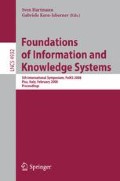Abstract
Logic programs under answer-set semantics constitute an important tool for declarative problem solving. In recent years, two research issues received growing attention. On the one hand, concepts like loops and elementary sets have been proposed in order to extend Clark’s completion for computing answer sets of logic programs by means of propositional logic. On the other hand, different concepts of program equivalence, like strong and uniform equivalence, have been studied in the context of program optimization and modular programming. In this paper, we bring these two lines of research together and provide alternative characterizations for different conceptions of equivalence in terms of unfounded sets, along with the related concepts of loops and elementary sets. Our results yield new insights into the model theory of equivalence checking. We further exploit these characterizations to develop novel encodings of program equivalence in terms of standard and quantified propositional logic, respectively.
This work was partially supported by the Austrian Science Fund (FWF) under grant P18019.
Access this chapter
Tax calculation will be finalised at checkout
Purchases are for personal use only
Preview
Unable to display preview. Download preview PDF.
References
Gelfond, M., Lifschitz, V.: Classical negation in logic programs and disjunctive databases. New Generation Computing 9(3–4), 365–385 (1991)
Van Gelder, A., Ross, K., Schlipf, J.: The well-founded semantics for general logic programs. Journal of the ACM 38(3), 620–650 (1991)
Baral, C.: Knowledge Representation, Reasoning and Declarative Problem Solving. Cambridge University Press, Cambridge (2003)
Leone, N., Rullo, P., Scarcello, F.: Disjunctive stable models: Unfounded sets, fixpoint semantics, and computation. Information and Computation 135(2), 69–112 (1997)
Clark, K.: Negation as failure. In: Gallaire, H., Minker, J. (eds.) Logic and Data Bases, pp. 293–322. Plenum Press, New York (1978)
Fages, F.: Consistency of Clark’s completion and the existence of stable models. Journal of Methods of Logic in Computer Science 1, 51–60 (1994)
Lin, F., Zhao, Y.: ASSAT: Computing answer sets of a logic program by SAT solvers. Artificial Intelligence 157(1–2), 115–137 (2004)
Lifschitz, V., Razborov, A.: Why are there so many loop formulas? ACM Transactions on Computational Logic 7(2), 261–268 (2006)
Giunchiglia, E., Lierler, Y., Maratea, M.: Answer set programming based on propositional satisfiability. Journal of Automated Reasoning 36(4), 345–377 (2006)
Leone, N., Pfeifer, G., Faber, W., Eiter, T., Gottlob, G., Perri, S., Scarcello, F.: The DLV system for knowledge representation and reasoning. ACM Transactions on Computational Logic 7(3), 499–562 (2006)
Simons, P., Niemelä, I., Soininen, T.: Extending and implementing the stable model semantics. Artificial Intelligence 138(1–2), 181–234 (2002)
Lee, J.: A model-theoretic counterpart of loop formulas. In: Kaelbling, L., Saffiotti, A. (eds.) IJCAI 2005. Proceedings of the 19th International Joint Conference on Artificial Intelligence, pp. 503–508. Professional Book Center (2005)
Gebser, M., Lee, J., Lierler, Y.: Elementary sets for logic programs. In: Gil, Y., Mooney, R. (eds.) AAAI 2006. Proceedings of the 21st National Conference on Artificial Intelligence. AAAI Press, California (2006)
Lifschitz, V., Pearce, D., Valverde, A.: Strongly equivalent logic programs. ACM Transactions on Computational Logic 2(4), 526–541 (2001)
Eiter, T., Fink, M.: Uniform equivalence of logic programs under the stable model semantics. In: Palamidessi, C. (ed.) ICLP 2003. LNCS, vol. 2916, pp. 224–238. Springer, Heidelberg (2003)
Turner, H.: Strong equivalence made easy: Nested expressions and weight constraints. Theory and Practice of Logic Programming 3(4–5), 602–622 (2003)
Eiter, T., Leone, N., Pearce, D.: Assumption sets for extended logic programs. In: Gerbrandy, J., Marx, M., de Rijke, M., Venema, Y. (eds.) JFAK. Essays Dedicated to Johan van Benthem on the Occasion of his 50th Birthday. Amsterdam University Press (1999)
Lin, F.: Reducing strong equivalence of logic programs to entailment in classical propositional logic. In: Fensel, D., Giunchiglia, F., McGuinness, D., Williams, M. (eds.) KR 2002. Proceedings of the 8th International Conference on Principles of Knowledge Representation and Reasoning, pp. 170–176. Morgan Kaufmann, San Francisco (2002)
Pearce, D., Tompits, H., Woltran, S.: Encodings for equilibrium logic and logic programs with nested expressions. In: Brazdil, P.B., Jorge, A.M. (eds.) EPIA 2001. LNCS (LNAI), vol. 2258, pp. 306–320. Springer, Heidelberg (2001)
Pearce, D., Tompits, H., Woltran, S.: Characterising equilibrium logic and nested logic programs: Reductions and complexity. Technical Report GIA-TR-2007-12-01, Universidad Rey Juan Carlos (2007)
Erdem, E., Lifschitz, V.: Tight logic programs. Theory and Practice of Logic Programming 3(4–5), 499–518 (2003)
Ferraris, P., Lee, J., Lifschitz, V.: A generalization of the Lin-Zhao theorem. Annals of Mathematics and Artificial Intelligence 47(1–2), 79–101 (2006)
Author information
Authors and Affiliations
Editor information
Rights and permissions
Copyright information
© 2008 Springer-Verlag Berlin Heidelberg
About this paper
Cite this paper
Gebser, M., Schaub, T., Tompits, H., Woltran, S. (2008). Alternative Characterizations for Program Equivalence under Answer-Set Semantics Based on Unfounded Sets. In: Hartmann, S., Kern-Isberner, G. (eds) Foundations of Information and Knowledge Systems. FoIKS 2008. Lecture Notes in Computer Science, vol 4932. Springer, Berlin, Heidelberg. https://doi.org/10.1007/978-3-540-77684-0_5
Download citation
DOI: https://doi.org/10.1007/978-3-540-77684-0_5
Publisher Name: Springer, Berlin, Heidelberg
Print ISBN: 978-3-540-77683-3
Online ISBN: 978-3-540-77684-0
eBook Packages: Computer ScienceComputer Science (R0)

